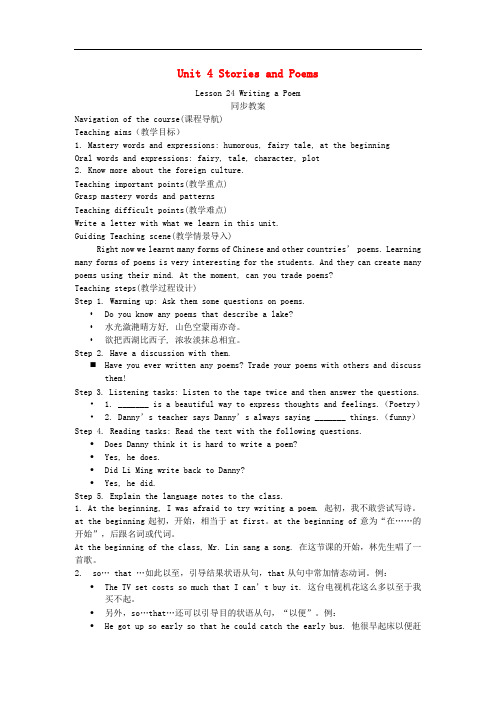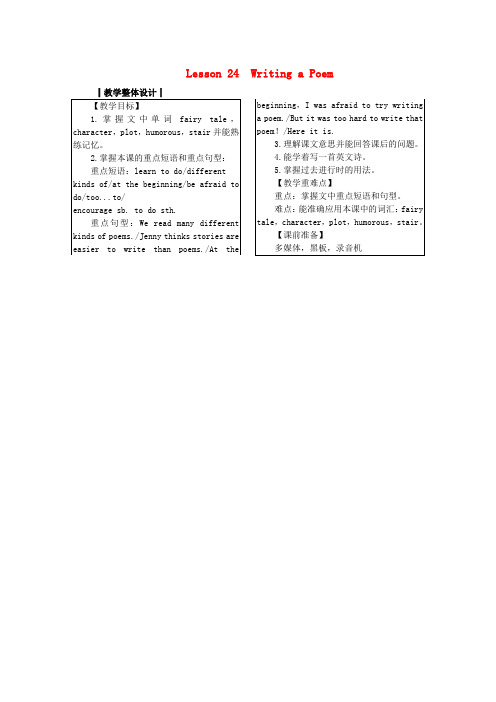九年级英语上册Unit4StoriesandPoemsLesson24WritingaPoem课时训
- 格式:doc
- 大小:29.50 KB
- 文档页数:2

Lesson24 :Writing a Poem Where: ClassroomSubject:EnglishTeacher: Liu XuepingTeaching aims:1.To learn about poems.2.To Keep the new words and phrases in mind.3.The using of “prefer”Step1. New words(Listen and read)fairy n. 仙子;小精灵tale n.故事;童话character n.(小说、戏剧当中的)人物;特点;特色plot n.情节humorous adj.幽默的;诙谐Step2:Speak ,Please1.一个小仙子 a little fairy2.一个可爱的小精灵 a lovely fairy3.许多童话 a number of tales4.童话的数量the number of tales5.固定数量的童话 a set number of tales6.各种各样的人物all kinds of characters7.一个伟大的角色 a great character8.一个有趣的情节an interesting plot9.太多的情节too many plots10.一个幽默的故事 a humorous tale/story11.一首幽默的诗 a humorous poem Step3. Make sentences(造句)1.莉莉像一个小仙女。
Lily is like a little fairy2.汤姆喜欢读童话故事。
Tom likes reading fairy tales3.这篇小说有很多人物。
There are a number of characters in the novel.4. 一个好故事必须有一个有趣的情节A good story must have an interesting plot5.我是一个幽默的人,你呢?I am a humorous person , What about you ? Step4. Read and Listen : true (T) or false (F).1. Danny learned how to write songs last week. ( )2. Danny likes reading stories.( )3. Danny thinks stories are easier to write.( )Step5.Read fast and find out the following phrases.1.这周this week2.许多不同种类的many different kinds of3.学习关于learn about4.一个有趣的情节an interesting plot5.开始at the beginning6.在湖边beside the lake7.一首幽默的诗 a humorous poem8.安静地说say quietly9.看起来滑稽look funny10.必须、不得不must/ have toStep6. Language points:1.prefer的用法(1)prefer sb /sth = like sb/sth better 更喜欢某人某物, Eg:I prefer Lily =I like Lily betterI prefer English =I like English better(2)prefer A to B 在A与B之间更喜欢A在苹果和梨子之间吉娜更喜欢苹果Eg:Gina prefers apples to pears.(3)prefer doing to doing sth在做前者与后者之间更喜欢前者Eg:Danny prefers _______(watch) TV rather than _____(play)sport.(4)prefer to do rather than do sth=would rather do thando sth.宁愿做某事而不愿做某事Eg:Jenny prefers_______(stay) at home rather than____(go) out on rainy days.同义句:Jenny would rather ______(stay) at home than _____(go) out on rainy days.(5)prefer to do sthEg:Jack prefers_______(go) there alone2. be always doing sthEg:Ben is always_________(be) late for schoolStep7. Exercises in class(课堂练习一----关于复习)关于learn的练习:1.As a student, We should learn_____(in /to/ from) Lei Feng .2.She learned_______(play) the piano at six.3.We learn _______(to/ at/ about) fables and fairy tales.4.We should learn a______ (class/lesson) from the story.关于kind 的练习1.This kind of clothes______(be) sold out Yesterday.2.There ____(be) all kinds of things in the shop.关于encourage 的练习1.Our teacher often encourages us________(study) hard.2.Helen Keller is famous for her_______(encourage)关于fun 与funny的练习1.The story is _______________.2.Danny is a _________ boy.3.What _______!关于beside 与next to的同义句替换1.Mary sits _______ Lily.2.Mary sits______ _____ Lily关于beginning的练习1.__ ___ ________(起初),I was afraid to write a poem.2.__ __ ________ ___ this term, I decided to study hard.关于afraid 的练习1.The little girl is afraid ______(go) out at night.2.The little boy is afraid _______(climb) onto the big tree.3.Danny can’t come to school. Can he?----- _________________. (我恐怕如此)He was ill.4.Would you like to come to my birthday party?---____________ (我恐怕不行) I have to look after my sick father.关于must的练习Son: Mum, may I watch TV for a while?Mum: No. It’s 10:00 in the evening. You_______go to sleep now.Student: Sorry, Mr. Hill. I am late for school.Headmaster: Come to school on time tomorrow. As a student,you_______ follow the rules of the school.Policeman: You______ slow down when you pass by a school. Driver: Sorry, sir!关于too…to句型的练习1.She is so young that she can’t go to school.(变简单句)Eg:She is _____ young ____ go to school.2.The box is so heavy that I can’t carry it.Eg:The box is ____ heavy for me ____ carry it.Exercises in class(课堂练习二-----关于新知)关于prefer的用法1.He prefers tea ____ coffee.(填介词)2.Brain prefers ______ (finish) the work alone.3.They prefer ______(die) rather than _____ (give) in.4.Gina prefers______(stay) at home to______(play) Sport.关于always的练习1.Jack is always_____ a lie.A. tellB. tellsC. toldD. telling2.You always ______ the same mistake.A.makingB. makeC. madeD. makes.Step8. homework1.全效率课堂小册24课跟踪练习。


Unit 4 Stories and PoemsLesson 24 Writing a Poem同步教案Navigation of the course(课程导航)Teaching aims(教学目标)1. Mastery words and expressions: humorous, fairy tale, at the beginningOral words and expressions: fairy, tale, character, plot2. Know more about the foreign culture.Teaching important points(教学重点)Grasp mastery words and patternsTeaching difficult points(教学难点)Write a letter with what we learn in this unit.Guiding Teaching scene(教学情景导入)Right now we learnt many forms of Chinese and other co untries’ poems. Learning many forms of poems is very interesting for the students. And they can create many poems using their mind. At the moment, can you trade poems?Teaching steps(教学过程设计)Step 1. Warming up: Ask them some questions on poems.•Do you know any poems that describe a lake?•水光潋滟晴方好, 山色空蒙雨亦奇。
•欲把西湖比西子, 浓妆淡抹总相宜。



Unit4 Stories and poems-Lesson24: Writing a Poem一、学习目标1.New words and expressions:fairy, tale, character, plot, humorous2.能力目标:灵活运用课堂中学的知识点。
3情感态度价值观:用生活中的实例记忆知识点。
二、重难点分析重点:Learn how to write a poem.难点:Learn how to write a poem.三、学习过程1.学法指导通过课前预习掌握基本知识,通过合作探究解决较难知识,通过堂达标巩固所学知识。
2.知识准备We learned to write stories and poems this week.I like reading stories, but I think they are very hard to write.Jenny thinks stories are easier to write tha n poems, but I don’t think so.But it was too hard to write than poem!3.预习检测用所给词的适当形式填空1.Which do you prefer_____(drink),tea or coffee?2.At the____(begin)of the new term, we had a new math teacher.3.My mother always encourages me_____(do)my best to succeed.4.Kate decided_____(write)a poem about the moon.5.Lei Feng was always ____(help)the others.4.任务导学(1)Read the text and find the words they don’t understand.(2)Learn the new words.(3)Learn some language points.(4)prefer v.更喜欢,宁愿,相当于like...better。

九年级英语上册Unit4StoriesandpoemsLesson24WritingaPoemUnit4StoriesandPoesLesson24ritingaPoeAnalysisoftheStudentsThestudentsofGrade9haveasteredcertainvocabularies,expressionsandstructures.Theyalsohavetheabilitiesof self-teachingandoringingroups.ostoftheareillingtoex presstheiropinionsinEnglish.AnalysisofTeachingcontentLesson24isthesixthlessoninUnit4,Boo5.Thisunitfocuso nthesubjectstoriesandpoes,alsoteachthestudentscultu ralaboutEuropean.Studentscaresaboutthesubjectbecaus eitisclosetoeveryone.Lesson24ainlytalsaboutthedairy froDanny,alsoteachthestudentshotoritethepoes.【知识目标】Toastertheords:fairytales,character,plot,huorous.Toastertheexpressions:atthebeginning【能力目标】Iprovethestudents’abilityofspeaing,listening,readingandriting.Learnto ritethepoeinEnglish.【情感目标】Studentscanenjoythepleasureofliterature.【教学重点】Theusageofprefer.【教学难点】Hotousethephrases.Taperecorder,ultiediaStep1.ar-upFreetal:Looatthepicture,hathappened?Step2.PresentationReadthepassageandasthequestions:hat’sthedifferencebeteenpoeandstory?DoesDannyafraidtoriteapoe?Thinaboutit:hichdoyouprefertorite?Poesorstories?hy? hataboutDanny?Explaintheneords.Readthelessonandritetrueorfalse.Dannylearnedhotoritesongslastee.Dannyliesreadingstories.Dannythinsstoriesareeasiertorite.Languagepoints:atthebeginning“开始时;起初”,at也可以换成in。

九年级英语上册Unit4 Stories and poems Lesson24 Writing a Poem教学设计新版冀教版一. 教材分析冀教版九年级英语上册Unit4 Stories and poems Lesson24 Writing a Poem是一个写作课。
本课的主题是学习写一首诗,通过欣赏和分析不同类型的诗歌,让学生掌握诗歌的基本结构和修辞手法,并能够创作一首属于自己的诗歌。
教材内容丰富,包括不同风格的诗歌示例、诗歌创作技巧指导和学生的创作实践。
二. 学情分析九年级的学生已经具备了一定的英语基础,能够理解和运用一些基本的英语句型和词汇。
然而,诗歌创作对于他们来说可能是一个新的挑战,需要引导学生充分发挥想象力和创造力。
此外,学生可能对诗歌的修辞手法和结构有一定的陌生感,因此需要教师在教学中进行详细的讲解和示范。
三. 教学目标1.能够理解并运用诗歌中的常用词汇和句型。
2.能够欣赏并分析不同类型的诗歌,理解诗歌的基本结构和修辞手法。
3.能够创作一首属于自己的诗歌,展示想象力和创造力。
4.培养对英语诗歌的兴趣和鉴赏能力。
四. 教学重难点1.诗歌中的修辞手法和结构的理解。
2.学生创作诗歌的能力的培养。
五. 教学方法1.任务驱动法:通过设定具体的写作任务,引导学生主动学习和参与。
2.案例分析法:通过分析不同类型的诗歌案例,让学生理解和掌握诗歌的基本结构和修辞手法。
3.互动式教学法:通过教师与学生、学生与学生之间的互动,激发学生的学习兴趣和创造力。
六. 教学准备1.准备不同类型的诗歌案例,包括示例和分析。
2.准备诗歌创作技巧的指导资料。
3.准备写作任务的要求和评价标准。
七. 教学过程1.导入(5分钟)通过展示一首美丽的英文诗歌,引发学生对诗歌的兴趣,并引导学生思考诗歌的特点和魅力。
2.呈现(10分钟)呈现不同的诗歌案例,让学生欣赏和分析。
引导学生关注诗歌的主题、结构、修辞手法等,并通过讨论和分享,让学生表达对诗歌的理解和感受。


Unit 4 Stories and PoemsLesson 24 Writing a PoemThe students of Grade 9 have mastered certain vocabularies,expressions and structures. They also have the abilities of self-teaching and working in groups. Most of them are willing to express their opinions in English.2. Analysis of Teaching ContentLesson 24 is the sixth lesson in Unit 4, Book 5.This unit focus on the subject stories and poems, also teach the students cultural about European. Students cares about the subject because it is close to everyone. Lesson 24 mainly talks about the dairy from Danny, also teach the students how to write the poems.【知识目标】1.To master the words : fairy tales, character, plot, humorous.2. To master the expressions: at the beginning【能力目标】Improve the students’ ability of speaking, listening, reading and writing. Learn to write the poem in English.【情感目标】Students can enjoy the pleasure of literature.【教学重点】The usage of prefer.【教学难点】How to use the phrases.Tape recorder, MultimediaStep 1. Warm-upFree talk: Look at the picture, what happened?Step 2. Presentation1.Read the passage and ask the questions:(1)What’s the difference between poem and story?(2)Does Danny afraid to write a poem?2.Think about it: Which do you prefer to write? Poems or stories? Why? What about Danny?3.Explain the new words.4.Read the lesson and write true (T) or false (F).(1)Danny learned how to write songs last week. ( )(2)Danny likes reading stories. ( )(3)Danny thinks stories are easier to write. ( )nguage points:at the beginning “开始时;起初”,at也可以换成in。


Lesson 24: Writing a Poem【学习目标】知识目标:humorous, fairy, tale, plot, character;fairy tale;I like reading stories, but I think they are very hard to write.Jenny thinks stories are easier to write than poems, but I don't think so. At the beginning, I was afraid to try writing a poem.But it was too hard to write that poem!能力目标:能学着写一首英文诗;复习情态动词must的用法。
情感目标:学习多种英文文体,从中发掘学习的乐趣,激发学习兴趣。
【重点及难点】复习情态动词must的用法;学着写一首英文诗。
【导学过程】一、自主预习Ⅰ.基础单词。
1. 偷幽默的,诙谐的__________2. 情节_________3. 人物,特点,特色____________4. 故事,童话__________5. 仙子,小精灵_________Ⅱ. 核心短语。
1. 童话故事 _______________2. 不同种类的 _______________3. 尝试做某事 _______________4. 鼓励某人做某事 _______________Ⅲ. 检查单词及词组的读法并校正。
二、合作探究Task1:速读,弄懂文章大意,完成Let's do It 1。
Task2:细读,并找出课文中所涉及的短语和句型。
Task3:小组讨论导学案上的Language Points。
Task 4:完成Let's do it 2、project。
三、交流展示Language Points:1. At the beginning, I was afraid to try writing a poem. 起初,我不敢尝试写诗歌。

Unit 4 Stories and PoemsLesson 24 Writing a Poem同步教案Navigation of the course(课程导航)Teaching aims(教学目标)1. Mastery words and expressions: humorous, fairy tale, at the beginningOral words and expressions: fairy, tale, character, plot2. Know more about the foreign culture.Teaching important points(教学重点)Grasp mastery words and patternsTeaching difficult points(教学难点)Write a letter with what we learn in this unit.Guiding Teaching scene(教学情景导入)Right now we learnt many forms of Chinese and other co untries’ poems. Learning many forms of poems is very interesting for the students. And they can create many poems using their mind. At the moment, can you trade poems?Teaching steps(教学过程设计)Step 1. Warming up: Ask them some questions on poems.•Do you know any poems that describe a lake?•水光潋滟晴方好, 山色空蒙雨亦奇。
•欲把西湖比西子, 浓妆淡抹总相宜。



Lesson 24
Ⅰ. 根据句意及首字母或汉语提示写出单词。
1. Many people like Xie Na because she is h .
2. How many c______ are there in the story?
3. My daughter likes to read fairy t_____ very much.
4. What are these ______ (诗) about?
5. Can you tell us the ______ (情节) of the story?
Ⅱ. 选词填空
awake, wake
6. Will you please me up at half past five this morning?
7. She looked at the ceiling in bed and stayed until midnight.
noise, sound, voice
8. Alice has a sweet .
9. travels more slowly than light.
10. The engine is making some funny .
Ⅲ. 单选
11. Which one do you ______, coffee or tea?
A. prefer
B. like
C. prefer better
D. like best
12. _____ the beginning of the meeting, David said nothing.
A. At
B. For
C. In
D. After
13. I felt _____ tired _____ I can’t walk on.
A. so; that
B. such; that
C. now; that
D. after; that
14. —Can I use your pen, Mary?
—Sure. _____.
A. Here you are
B. Here are you
C. You are here
D. Are here you
连词成句
15. different, kinds, students, like, books, of
.
16. a, write, you, about, nature, poem, can
?
17. at, I, to, don’t, the, know, say, beginning, what
.
18. this, always, doing, scientist, is, researches
.
19. it, how, write, I, can, well
?
Lesson 7
1. humorous
2. characters
3. tales
4. poems
5. plot
6. wake
7. awake
8. voice
9. Sound 10. noise 11. A 12. A 13. A
14. A
15. Students like different kinds of books.
16. Can you write a poem about nature
17. I don’t know what to say at the beginning
18. This scientist is always doing researches.
19. How can I write it well。